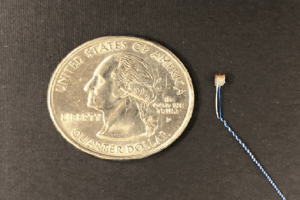
Data showing the effective use of a long-term vagus nerve implant in mice have been presented at the North American Neuromodulation Society’s (NANS) annual meeting (23–26 January, Las Vegas, USA). Ibrahim Mughrabi from The Feinstein Institutes for Medical Research at Northwell Health reported the results, concluding: “The implants were functional for 60–90 days, [and] in regular test sessions, vagus nerve stimulation [VNS] delivered through the implant caused physiological effects indicative of vagus nerve activation.”
Furthermore, Mughrabi said that some mice were subjected to a final test of whether VNS delivered through the long-term implants can suppress acute inflammation. The investigators found that when VNS was delivered through 60–90 days, it was successful at supressing inflammation in two out of four mice. “This provides a way forward for testing long-term VNS in chronic inflammatory conditions,” remarked Mughrabi.
On the rationale behind the research, he put forward that previous preclinical VNS studies have been limited to short-term stimulation (from minutes to hours), due to the surgical and technological challenges of implanting a stimulator small enough to fit a mouse nerve. This led Stavros Zanos, assistant professor at the Institute of Bioelectronic Medicine, to develop new techniques to deliver long-term electrical stimulation in mice—according to a press release.
In the study, a commercial bipolar cuff electrode was implanted around the left cervical vagus nerve of mice. The electrode functionality was evaluated over up to 90 days after implantation, and through electrocardiogram and breathing sensors researchers were able to measure real-time physiological responses to neurostimulation and adjust stimulation intensity accordingly.
By extending the research window of stimulation, from a single action to up to 90 days, a long-term vagus nerve implant provides “new opportunities” to thoroughly investigate the therapeutic potential of chronic VNS in a range of relevant diseases modelled in mice, noted Mughrabi.
“The ability to chronically stimulate the vagus nerve through a permanent implant has not been reported before in mice,” he added. “We are eager to continue to advance this new approach and look forward to the positive impact this implant will have on future bioelectronic research around the world.”
The research was conducted in collaboration with Robert Froemke, associate professor at New York University, USA, and Cristin Welle, assistant professor at University of Colorado, Boulder, USA.








